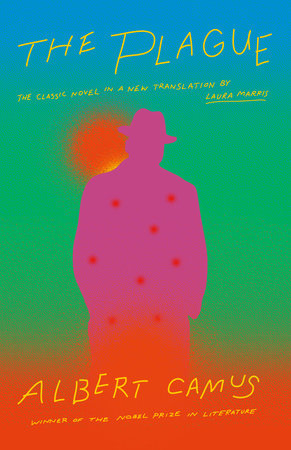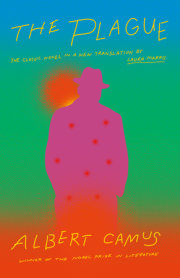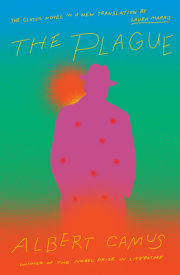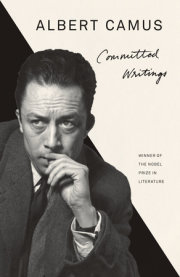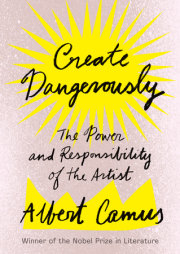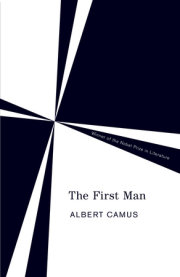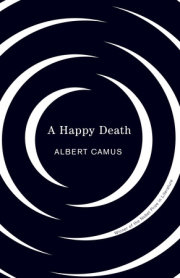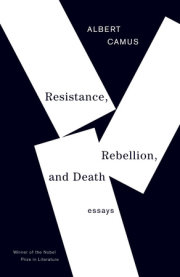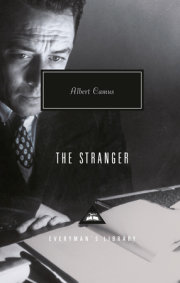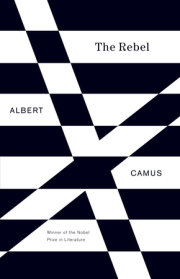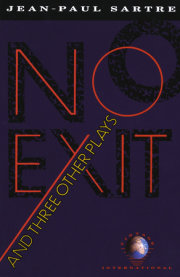PART ONE
The unusual events described in this chronicle occurred in 194– at Oran. Everyone agreed that considering their somewhat extraordinary character, they were out of place there. For its ordinariness is what strikes one first about the town of Oran, which is merely a large French port on the Algerian coast, headquarters of the Prefect of a French department.
The town itself, let us admit, is ugly. It has a smug, placid air and you need time to discover what it is that makes it different from so many business centers in other parts of the world. How to conjure up a picture, for instance, of a town without pigeons, without any trees or gardens, where you never hear the beat of wings or the rustle of leaves—a thoroughly negative place, in short? The seasons are discriminated only in the sky. All that tells you of spring's coming is the feel of the air, or the baskets of flowers brought in from the suburbs by peddlers; it's a spring cried in the marketplaces. During the summer the sun bakes the houses bone-dry, sprinkles our walls with grayish dust, and you have no option but to survive those days of fire indoors, behind closed shutters. In autumn, on the other hand, we have deluges of mud. Only winter brings really pleasant weather.
Perhaps the easiest way of making a town's acquaintance is to ascertain how the people in it work, how they love, and how they die. In our little town (is this, one wonders, an effect of the climate?) all three are done on much the same lines, with the same feverish yet casual air. The truth is that everyone is bored, and devotes himself to cultivating habits. Our citizens work hard, but solely with the object of getting rich. Their chief interest is in commerce, and their chief aim in life is, as they call it, “doing business.” Naturally they don't eschew such simpler pleasures as love-making, seabathing, going to the pictures. But, very sensibly, they reserve these pastimes for Saturday afternoons and Sundays and employ the rest of the week in making money, as much as possible. In the evening, on leaving the office, they forgather, at an hour that never varies, in the cafés, stroll the same boulevard, or take the air on their balconies. The passions of the young are violent and short-lived; the vices of older men seldom range beyond an addiction to bowling, to banquets and “socials,” or clubs where large sums change hands on the fall of a card.
It will be said, no doubt, that these habits are not peculiar to our town; really all our contemporaries are much the same. Certainly nothing is commoner nowadays than to see people working from morn till night and then proceeding to fritter away at card-tables, in cafés and in small-talk what time is left for living. Nevertheless there still exist towns and countries where people have now and then an inkling of something different. In general it doesn't change their lives. Still, they have had an intimation, and that's so much to the good. Oran, however, seems to be a town without intimations; in other words, completely modern. Hence I see no need to dwell on the manner of loving in our town. The men and women consume one another rapidly in what is called “the act of love,” or else settle down to a mild habit of conjugality. We seldom find a mean between these extremes. That, too, is not exceptional. At Oran, as elsewhere, for lack of time and thinking, people have to love one another without knowing much about it.
What is more exceptional in our town is the difficulty one may experience there in dying. “Difficulty,” perhaps, is not the right word, “discomfort” would come nearer. Being ill is never agreeable, but there are towns that stand by you, so to speak, when you are sick; in which you can, after a fashion, let yourself go. An invalid needs small attentions, he likes to have something to rely on, and that's natural enough. But at Oran the violent extremes of temperature, the exigencies of business, the uninspiring surroundings, the sudden nightfalls, and the very nature of its pleasures call for good health. An invalid feels out of it there. Think what it must be for a dying man, trapped behind hundreds of walls all sizzling with heat, while the whole population, sitting in cafés or hanging on the telephone, is discussing shipments, bills of lading, discounts! It will then be obvious what discomfort attends death, even modern death, when it waylays you under such conditions in a dry place.
These somewhat haphazard observations may give a fair idea of what our town is like. However, we must not exaggerate. Really, all that was to be conveyed was the banality of the town's appearance and of life in it. But you can get through the days there without trouble, once you have formed habits. And since habits are precisely what our town encourages, all is for the best. Viewed from this angle, its life is not particularly exciting; that must be admitted. But, at least, social unrest is quite unknown among us. And our frank-spoken, amiable, and industrious citizens have always inspired a reasonable esteem in visitors. Treeless, glamourless, soulless, the town of Oran ends by seeming restful and, after a while, you go complacently to sleep there.
It is only fair to add that Oran is grafted on to a unique landscape, in the center of a bare plateau, ringed with luminous hills and above a perfectly shaped bay. All we may regret is the town's being so disposed that it turns its back on the bay, with the result that it's impossible to see the sea, you always have to go to look for it.
Such being the normal life of Oran, it will be easily understood that our fellow citizens had not the faintest reason to apprehend the incidents that took place in the spring of the year in question and were (as we subsequently realized) premonitory signs of the grave events we are to chronicle. To some, these events will seem quite natural; to others, all but incredible. But, obviously, a narrator cannot take account of these differences of outlook. His business is only to say: "This is what happened," when he knows that it actually did happen, that it closely affected the life of a whole populace, and that there are thousands of eyewitnesses who can appraise in their hearts the truth of what he writes.
In any case the narrator (whose identity will be made known in due course) would have little claim to competence for a task like this, had not chance put him in the way of gathering much information, and had he not been, by the force of things, closely involved in all that he proposes to narrate. This is his justification for playing the part of a historian. Naturally, a historian, even an amateur, always has data, personal or at second hand, to guide him. The present narrator has three kinds of data: first, what he saw himself; secondly, the accounts of other eyewitnesses (thanks to the part he played, he was enabled to learn their personal impressions from all those figuring in this chronicle); and, lastly, documents that subsequently came into his hands. He proposes to draw on these records whenever this seems desirable, and to employ them as he thinks best. He also proposes . . .
But perhaps the time has come to drop preliminaries and cautionary remarks and to launch into the narrative proper. The account of the first days needs giving in some detail.
Copyright © 1991 by Albert Camus. All rights reserved. No part of this excerpt may be reproduced or reprinted without permission in writing from the publisher.

